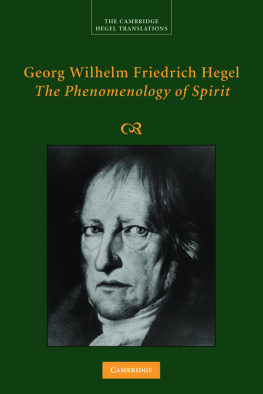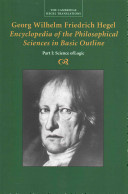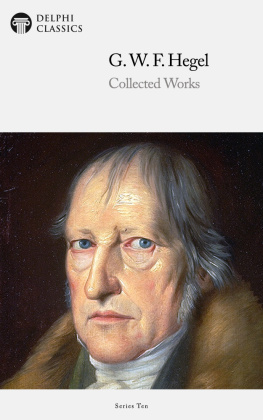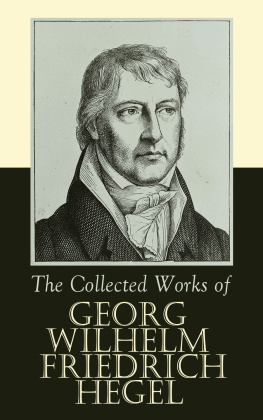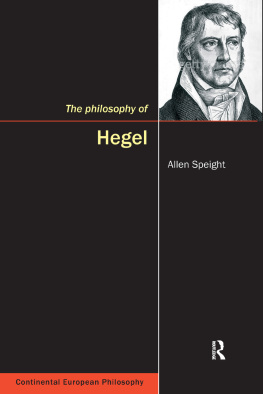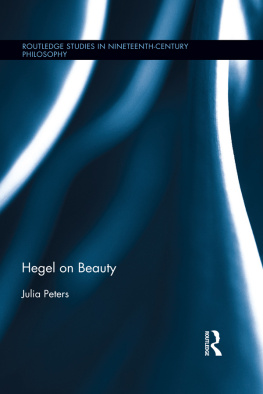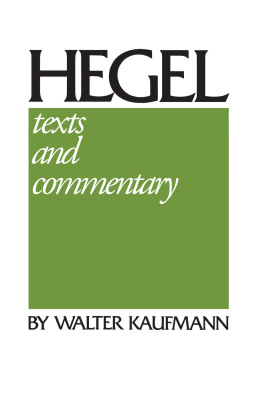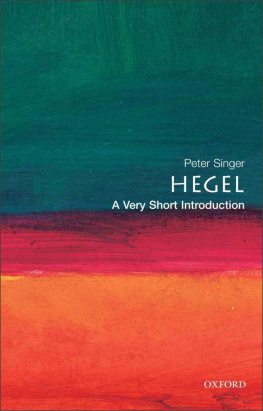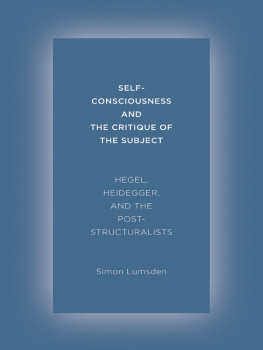Hegel Georg Wilhelm Fredrich - Georg Wilhelm Friedrich Hegel - the Phenomenology of Spirit
Here you can read online Hegel Georg Wilhelm Fredrich - Georg Wilhelm Friedrich Hegel - the Phenomenology of Spirit full text of the book (entire story) in english for free. Download pdf and epub, get meaning, cover and reviews about this ebook. year: 2018, publisher: Cambridge Univ Pr, genre: Religion. Description of the work, (preface) as well as reviews are available. Best literature library LitArk.com created for fans of good reading and offers a wide selection of genres:
Romance novel
Science fiction
Adventure
Detective
Science
History
Home and family
Prose
Art
Politics
Computer
Non-fiction
Religion
Business
Children
Humor
Choose a favorite category and find really read worthwhile books. Enjoy immersion in the world of imagination, feel the emotions of the characters or learn something new for yourself, make an fascinating discovery.
- Book:Georg Wilhelm Friedrich Hegel - the Phenomenology of Spirit
- Author:
- Publisher:Cambridge Univ Pr
- Genre:
- Year:2018
- Rating:4 / 5
- Favourites:Add to favourites
- Your mark:
- 80
- 1
- 2
- 3
- 4
- 5
Georg Wilhelm Friedrich Hegel - the Phenomenology of Spirit: summary, description and annotation
We offer to read an annotation, description, summary or preface (depends on what the author of the book "Georg Wilhelm Friedrich Hegel - the Phenomenology of Spirit" wrote himself). If you haven't found the necessary information about the book — write in the comments, we will try to find it.
Georg Wilhelm Friedrich Hegel - the Phenomenology of Spirit — read online for free the complete book (whole text) full work
Below is the text of the book, divided by pages. System saving the place of the last page read, allows you to conveniently read the book "Georg Wilhelm Friedrich Hegel - the Phenomenology of Spirit" online for free, without having to search again every time where you left off. Put a bookmark, and you can go to the page where you finished reading at any time.
Font size:
Interval:
Bookmark:

Georg Wilhelm Friedrich Hegel
The Phenomenology of Spirit
Hegel's Phenomenology of Spirit (1807) is one of the most influential texts in the history of modern philosophy. In it, Hegel proposed an arresting and novel picture of the relation of mind to world and of people to each other. Like Kant before him, Hegel offered up a systematic account of the nature of knowledge, the influence of society and history on claims to knowledge, and the social character of human agency itself. A bold new understanding of what, after Hegel, came to be called subjectivity arose from this work, and it was instrumental in the formation of later philosophies, such as existentialism, Marxism, and American pragmatism, each of which reacted to Hegel's radical claims in different ways. This edition offers a new translation, an introduction, and glossaries to assist readers understanding of this central text, and will be essential for scholars and students of Hegel.
Terry Pinkard is Professor of Philosophy at Georgetown University. He has published numerous books on German philosophy and on Hegel in particular, including Hegel's Phenomenology: The Sociality of Reason (Cambridge, 1994), Hegel: A Biography (Cambridge, 2000), and German Philosophy 17601860: The Legacy of Idealism (Cambridge, 2002).
Michael Baur
Georg Wilhelm Friedrich Hegel
The Phenomenology of Spirit
Translated and edited by
Terry Pinkard
Georgetown University, Washington DC


University Printing House, Cambridge cb 2 8 bs , United Kingdom
One Liberty Plaza, 20th Floor, New York, ny 10006, USA
477 Williamstown Road, Port Melbourne, vic 3207, Australia
314-321, 3rd Floor, Plot 3, Splendor Forum, Jasola District Centre, New Delhi - 110025, India
79 Anson Road, #06-04/06, Singapore 079906
Cambridge University Press is part of the University of Cambridge.
It furthers the University's mission by disseminating knowledge in the pursuit of education, learning, and research at the highest international levels of excellence.
www.cambridge.org
Information on this title: www.cambridge.org/9780521855792
doi: 10.1017/9781139050494
Terry Pinkard 2018
This publication is in copyright. Subject to statutory exception and to the provisions of relevant collective licensing agreements, no reproduction of any part may take place without the written permission of Cambridge University Press.
First published 2018
Printed in the United Kingdom by Clays, St Ives plc
A catalogue record for this publication is available from the British Library
Library of Congress Cataloging-in-Publication data
Names: Hegel, Georg Wilhelm Friedrich, 17701831, author. | Pinkard, Terry P., editor.
Title: Georg Wilhelm Friedrich Hegel : The phenomenology of spirit / Georg Wilhelm Friedrich Hegel ; [edited by] Terry Pinkard, Georgetown University, Washington DC.
Other titles: Phnomenologie des Geistes. English
Description: New York : Cambridge University Press, 2017. | Series: The American Society of Missiology series ; No. 55 | Includes bibliographical references and index.
Identifiers: LCCN 2017035387 | ISBN 9780521855792 (alk. paper)
Subjects: LCSH: Spirit. | Consciousness. | Truth. | Hegel, Georg Wilhelm Friedrich, 17701831. Phnomenologie des Geistes.
Classification: LCC B2928.E5 P56 2017 | DDC 193dc23
LC record available at https://lccn.loc.gov/2017035387
isbn 978-0-521-85579-2 Hardback
Cambridge University Press has no responsibility for the persistence or accuracy of URLs for external or third-party internet websites referred to in this publication and does not guarantee that any content on such websites is, or will remain, accurate or appropriate.
To Susan
Since the draft of this translation had an online existence for a few years, I received many helpful tips and suggestions from too many people to mention. Thanks to all of you.
Several long discussions with Rolf-Peter Horstmann at the beginning of the project helped to put it in sharper focus, and I am grateful for his help.
Terence Moore of Cambridge University Press was a great help and discussant for the project. It was he who actually launched it. All who worked with him miss his lively talks and exuberance.
His successor, Hilary Gaskin, has been very helpful in shepherding this project through.
Michael Baur, the editor of the series, gave me some very helpful advice about the introduction and the first two chapters of the Consciousness section. I have also tried to incorporate his advice into the rest of the translation.
I would like to thank my copyeditor, Rose Bell, for her irreplaceable help in preparing the manuscript.
Hegel frequently described his 1807 Phenomenology of Spirit to his students as his voyage of discovery. It was in that work, Hegel's first published version of his own systematic views, that Hegel, a virtually unknown, barely employed academic figure in Jena, became Hegel, the philosopher celebrated all over Europe. Nonetheless, however much of a voyage the book was for him, it was by no means an easy passage. Published in April of 1807, it was a work written hurriedly while Hegel was in extremely dire circumstances. He was thirty-seven when the Phenomenology appeared, and during its composition he had no tenable job, no real prospects, and an illegitimate child on the way. He did indeed have a teaching position at the university at Jena, but the salary for that position was not merely meager, it was nothing at all (Hegel was a private lecturer at the university). He had been supporting himself in a condition rapidly approximating to a state of penury on the basis of a small inheritance he had obtained when his father died in 1799. In 1806, the minister of the government which ran the university, Johann Wolfgang Goethe himself, managed to procure a 100 Thaler per year salary for the beleaguered Hegel, but that really amounted to a minor honorarium, not a sum that even the poorest student could live on. To survive, Hegel needed some type of employment, and, if it was to be in a university, he was going to have to produce a book of some importance. However, not only were positions at universities few and far between, they were becoming even scarcer because of the Napoleonic wars in Germany at the time. The Phenomenology was a book born out of both despair and a steadfast confidence on Hegel's own part that his audience whom he envisaged to be no less than the people of modern Europe itself needed this book.
Font size:
Interval:
Bookmark:
Similar books «Georg Wilhelm Friedrich Hegel - the Phenomenology of Spirit»
Look at similar books to Georg Wilhelm Friedrich Hegel - the Phenomenology of Spirit. We have selected literature similar in name and meaning in the hope of providing readers with more options to find new, interesting, not yet read works.
Discussion, reviews of the book Georg Wilhelm Friedrich Hegel - the Phenomenology of Spirit and just readers' own opinions. Leave your comments, write what you think about the work, its meaning or the main characters. Specify what exactly you liked and what you didn't like, and why you think so.

